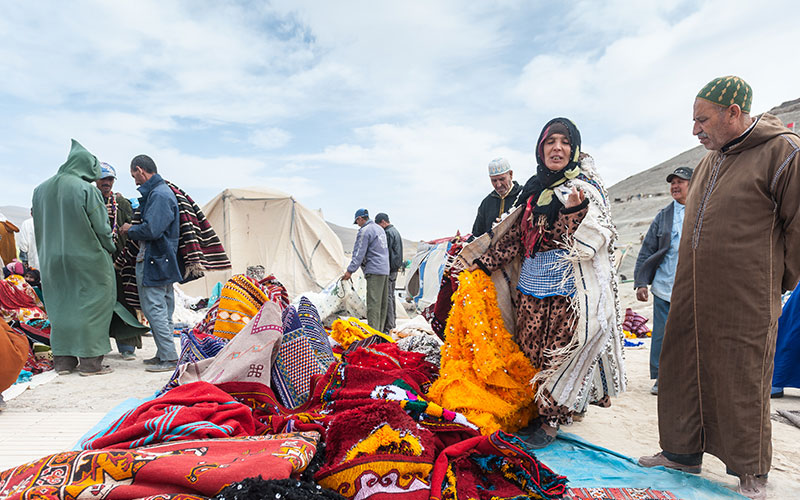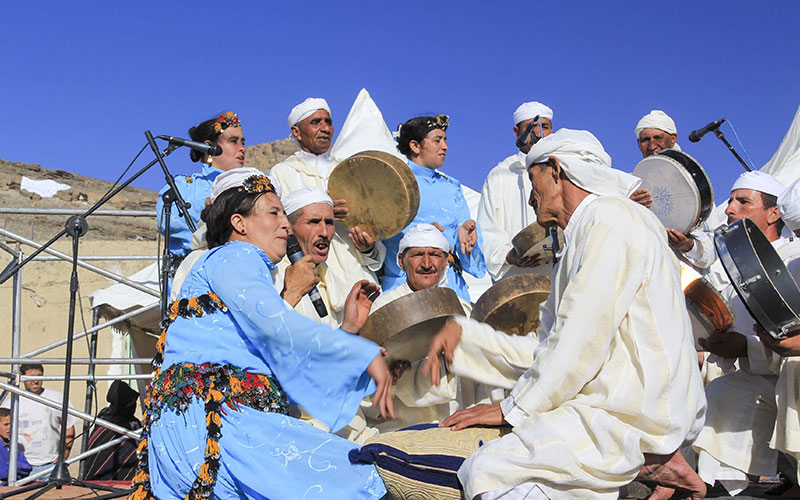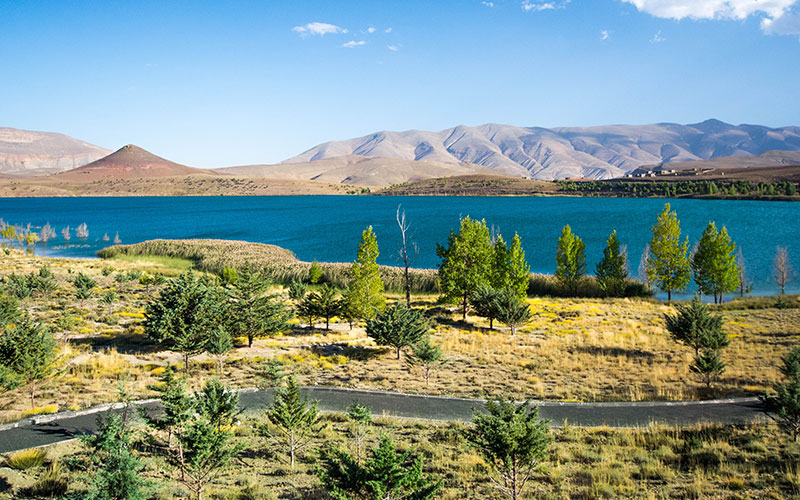The Imilchil Marriage Festival
Imilchil, a picturesque village nestled in the Middle Atlas Mountains of Morocco, holds a special allure for those seeking an authentic cultural experience. This remote village is predominantly inhabited by Berber tribal clans, who have meticulously preserved their rich heritage and traditions for generations. At the heart of Imilchil’s charm lies the Imilchil Marriage Festival, an annual event that takes place in September and serves as the village’s main attraction.
The Imilchil marriage festival is a cultural extravaganza & gathering tribes
The Imilchil Marriage Festival, also known as September Romance, is a celebration deeply rooted in the Aït Yaazza culture, where an annual collective marriage ceremony takes place. It brings together the surrounding tribes, particularly the Aït Sokham and Aït Bouguemmaz, who gather in Souk Aam and Agdoud N’Oulmghenni for this grand occasion.
During the festival, approximately 30,000 people from the mountains convene under tents, accompanied by their flocks, horses, and camels. The atmosphere is vibrant and enchanting as young girls dress in their finest attire, adorned with exquisite silver jewelry. They dance fervently under the starry skies for hours, showcasing their grace and elegance.
the language of gestures & nods, expressing love in Berber & marriage arrangements
Traditionally, the festival incorporates an unspoken language of communication between men and women. A subtle nod or a fleeting wink can express interest, with men often seeking the assistance of friends to overcome any shyness. If a woman reciprocates the gesture, they may hold hands to demonstrate their intent. Conversely, releasing one’s hand signifies rejection.

A significant moment occurs when a potential bride utters the magical phrase, “You have captured my liver, or my liver pines for you.” In Berber culture, the liver, not the heart, is believed to be the seat of true love. A healthy liver is thought to aid digestion and promote overall well-being. If both parties express consent, the couple and their families convene in a tent, where warm mint tea is shared, and discussions about the potential marriage unfold. Further arrangements are later made in the couple’s respective home village.
Interestingly, divorce is permitted if a marriage proves to be unhappy, and as a result, divorced or widowed women comprise a majority at the Imilchil Festival. They can be identified by their distinctive pointed headdresses.
The legend behind the festival: the tragic love story of Isly & Tislit
While it is commonly believed that weddings take place during the Imilchil Marriage Festival, it is, in fact, a commemoration of a bittersweet Moroccan legend. The festival pays homage to two young lovers from enemy tribes who, due to family opposition, were unable to marry. Overwhelmed by despair, they wept incessantly, and their tears formed two separate lakes—the “Isli” lake for the bridegroom and the “Tislit” lake for the bride. Tragically, they chose to end their lives by drowning in these lakes. The Imilchil Moussem was established to honor their poignant tale, with the belief that their souls remained apart even in death due to the mountain separating the two lakes.
This sorrowful legend prompted a change in the village’s traditions. Families decided to grant their children complete freedom in choosing their life partners. Today, neighboring tribes gather near the lakes, where women exercise the right to select their husbands—a remarkable testament to the festival’s evolution.

In addition to its role as a marriage venue, the Imilchil Moussem also functions as a lively market, attracting artisans and farmers who offer their goods to a broader audience than the weekly Souk allows. Attending the Imilchil Marriage Festival provides an extraordinary opportunity to immerse oneself in a world of delectable cuisine, captivating music, exuberant dancing, and the resplendent sight of Berbers adorned in traditional ceremonial attire.
Moreover, the Imilchil Marriage Festival has gradually opened its doors to visitors in recent years, aiming to stimulate tourism while maintaining its authenticity. This presents a unique chance for travelers to witness and partake in the festivities firsthand. The festival offers a captivating blend of cultural immersion, stunning landscapes, and the warmth of Berber hospitality.
Opening doors to visitors: the Festival growing tourism appeal & tips for visitors
If you plan to attend the Imilchil Marriage Festival, it is advisable to come prepared to fully embrace the experience. Immerse yourself in the local customs and traditions, interact with the friendly villagers, and savor the tantalizing flavors of Moroccan cuisine. From traditional music performances that resonate through the mountains to witnessing the intricate dances performed by locals, every moment of the festival is steeped in cultural significance.

Exploring the nearby lakes, Isli and Tislit, adds an extra layer of enchantment to your journey. These serene bodies of water, surrounded by majestic mountains, hold a palpable sense of romance and tragedy, serving as a reminder of the enduring legend that inspired the festival.
It is important to note that while the Imilchil Marriage Festival has gained popularity and opened to outsiders, it is still rooted in its traditional customs and remains an authentic celebration of Berber culture. Respect for local traditions, modest attire, and cultural sensitivities are essential for visitors attending this cherished event.
To plan your visit and stay informed about the current state of the festival, it is recommended to reach out to local tourism authorities or connect with travel agencies specializing in Moroccan cultural experiences. These resources will provide valuable insights and help ensure a memorable and respectful participation in the Imilchil Marriage Festival.
Embarking on a journey to the Imilchil Marriage Festival grants you a glimpse into a world where ancient customs intertwine with breathtaking landscapes, creating an unforgettable tapestry of love, tradition, and community. Witness the union of tribes, witness the beauty of the Atlas Mountains, and embrace the spirit of the Imilchil Marriage Festival—a celebration that embodies the enduring power of love and the richness of Moroccan culture.






